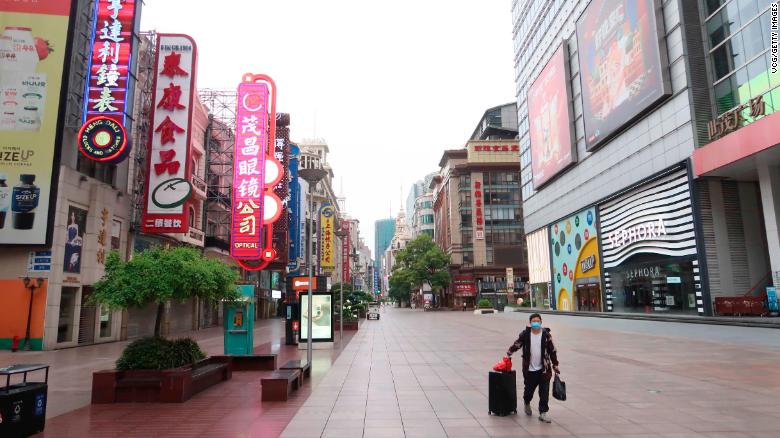Why is the Chinese economy falling?
2:28
(CNN) --
China's giant services sector just shrank at its second-fastest pace on record, as the Covid-19 lockdowns hit businesses hard.
The Caixin Purchasing Managers' Index, a widely followed indicator for assessing the state of the economy, slumped to 36.2 in April from 42 points in March, according to a survey released by IHS Markit on Thursday.
A reading below 50 indicates shrinkage, while anything above that value shows growth.
The service sector accounts for more than half of the country's GDP and more than 40% of employment.
And with survey data showing China's manufacturing sector also contracted last month, the world's second-biggest economy fell back in April.
China is obsessed with disinfecting against covid-19.
But is it causing more harm than good?
Although conditions could improve this month as covid infection rates ease and officials try to limit damage to the economy, large areas of Beijing have just come under tighter restrictions and some economists now forecast that GDP Chinese will decline in the second quarter.
The country's capital effectively locked down its largest district, Chaoyang, suspending transportation within it and urging 3.5 million residents to work from home as part of its latest effort to curb Covid-19 cases, it was announced on Wednesday. local authorities.
advertising
The nearly 6-point decline in services activity in April was the second after the February 2020 crash, when the Chinese economy came close to grinding to a halt as it struggled to contain the initial coronavirus outbreak that emerged in Wuhan.
In that month, the Caixin services PMI plummeted to 26.5 from 51.8 in January.
The nearly empty Nanjing Road pedestrian street is seen during the holiday on May 1, 2022 in Shanghai, China.
Companies in the world's second-largest economy were already grappling with rising energy and raw material costs, when Covid lockdowns further hampered their operations.
It has also made it more difficult for businesses to be able to pass on higher prices to consumers, due to the impact that covid restrictions have had on customer demand.
This translates into an even greater decline in employment.
"Some companies, hit by falling orders, laid off workers to cut costs," Wang said. The service sector employment measure has been below 50 for four consecutive months, according to the survey.
The data came just hours after China reported a sharp drop in tourism spending on the Labor Day national holiday.
Tourist spending was just 64.7 billion yuan ($9.8 billion) during the five holidays, down 43% from the same period last year, according to a statement from the Ministry of Culture and Tourism, as of late. Wednesday time.
Citizens made 160 million national tourist trips during the holidays, 30% less than the previous year.
The data once again highlights how China's zero covid policy has wreaked havoc on its economy.
ANALYSIS |
The "zero covid-19" policy is showing signs of strain in China.
But abandoning her now could be a disaster
On Saturday, government PMI surveys indicated that both manufacturing and non-manufacturing activities plunged in April to their worst levels since February 2020.
"Recent mobility trends suggest China's growth momentum deteriorated significantly in April," analysts at Fitch Ratings wrote on Tuesday.
They expect GDP to contract in the second quarter, before output picks up in the second half.
Nomura analysts also warned last month of a growing risk of a "recession" in the second quarter as lockdowns, a contraction in the real estate sector and slowing exports hit the economy hard.
As the highly transmissible omicron variant spreads rapidly in China, the country is battling its worst outbreak in more than two years.
So far, at least 27 Chinese cities are under full or partial lockdown, which could affect up to 185 million residents across the country, according to CNN's latest estimate.
Among them is Shanghai, the country's main financial center and a major manufacturing and transportation hub.
The city has been in lockdown since March 28.
Although the authorities began to lift some restrictions last month, more than 8 million residents are still prohibited from leaving their residential compounds.
To the kicks: Shanghai police break into a house for covid-19 case 0:51
The Chinese government continues to enforce its strict zero-Covid policy more than two years after the initial outbreak, at a time when the rest of the world is learning to live with the disease.
The policy involves mandatory mass testing and strict lockdowns to contain the spread of the virus.
But the economic costs are rising.
Many economists lowered their targets for China's GDP growth for this year, citing the risks of the zero covid policy.
Last month, the International Monetary Fund lowered its growth forecast for China to 4.4%, well below the government's official target of around 5.5%.
In recent days, Chinese leaders have repeatedly tried to reassure public opinion on how to correct the economy.
Last week, President Xi Jinping called for an injection of infrastructure spending to promote growth.
And the Communist Party's Politburo promised last Friday "specific measures" to support the internet economy.
ChinacoronavirusCovid-19

